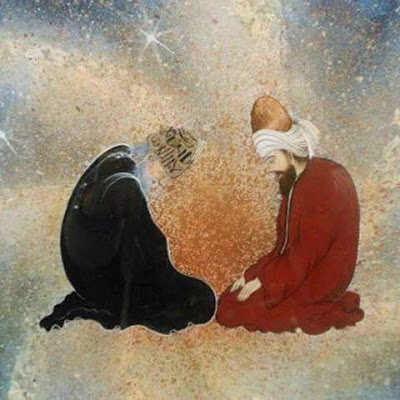The Sun's Beams Strike The Wall
Whatsoever is perceived by sense He annuls,
But He stablishes that which is hidden from the senses.
The lover's love is visible, his Beloved hidden.
The Friend is absent, the distraction He causes present.
Renounce these affections for outward forms,
Love depends not on outward form or face.
Whatever is beloved is not a mere empty form,
Whether your beloved be of earth or heaven.
Whatever is the form you have fallen in love with
Why do you forsake it the moment life leaves it?
The form is still there; whence then this disgust at it?
Ah! lover, consider well what is really your beloved.
If a thing perceived by outward senses is the beloved,
Then all who retain senses must still love it;
And since Love increases constancy,
How can constancy fail while form abides?
But the truth is, the sun's beams strike the wall,
And the wall only reflects that borrowed light.
Why give your heart to mere stones, O simpleton?
Go! Seek the Source of Light which shines always!
Mevlana Jelaluddin Rumi From: Charles F. Horne, ed., The Sacred Books and Early Literature of the East, Vol.VIII: Medieval Persia, pp. 111-130.
But He stablishes that which is hidden from the senses.
The lover's love is visible, his Beloved hidden.
The Friend is absent, the distraction He causes present.
Renounce these affections for outward forms,
Love depends not on outward form or face.
Whatever is beloved is not a mere empty form,
Whether your beloved be of earth or heaven.
Whatever is the form you have fallen in love with
Why do you forsake it the moment life leaves it?
The form is still there; whence then this disgust at it?
Ah! lover, consider well what is really your beloved.
If a thing perceived by outward senses is the beloved,
Then all who retain senses must still love it;
And since Love increases constancy,
How can constancy fail while form abides?
But the truth is, the sun's beams strike the wall,
And the wall only reflects that borrowed light.
Why give your heart to mere stones, O simpleton?
Go! Seek the Source of Light which shines always!
Mevlana Jelaluddin Rumi From: Charles F. Horne, ed., The Sacred Books and Early Literature of the East, Vol.VIII: Medieval Persia, pp. 111-130.



Yorumlar
Yorum Gönder